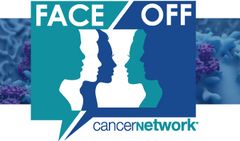
Superiority of Asciminib in CML-CP Is a ‘Win-Win’ for Patients
Talha Badar, MBBS, MD, discussed the unmet needs in the treatment of chronic myeloid leukemia in chronic phase.
Episodes in this series

As part of CancerNetwork’s Face-Off video series, Talha Badar, MBBS, MD, assistant professor of oncology, Mayo Clinic, discussed unmet needs in the treatment of chronic myeloid leukemia in chronic phase (CML-CP), and how results from the phase 3 ASCEMBL study (NCT03106779) are addressing these gaps.
In the trial, investigators assessed asciminib (Scemblix) at 40 mg twice daily vs bosutinib (Bosulif) at 500 mg once daily in patients with CP-CML who had been treated with 2 or more TKIs. A total of 223 patients were randomized 2:1 to active or control therapy with a median follow-up of 14.9 months. At baseline, MCyR was observed in 29.3% of patients in the asciminib arm vs 28.9% in the bosutinib arm. After the data analysis cutoff date, treatment was ongoing in 61.8% vs 28.9% of patients, respectively, with 37.6% and 71.1% discontinuing therapy.
The 24-week MMR rate was 25.5% in the asciminib arm and 13.2% in the bosutinib arm, equating to a 12.2% difference between groups after adjusting for baseline MCyR rates (95% CI, 2.19%-22.30%; 2-sided P = .029). The cumulative incidence of MMR at week 24 was 25.0% in the asciminib arm vs 12.0% in the bosutinib arm.
Badar: The 2 ways of thinking of it, and 1 unmet need is when the disease evolved with time. With prior lines of therapy, the patient tends to develop resistance mechanism, resistant mutation, in which T315I has been the most threatening in terms of patients’ prognosis and outcome. And for those patients, we have only 2 approved oral therapies: asciminib and ponatinib [Iclusig].
There's another medication which is an IV form, which is methadone that has been used prior to advent of ponatinib. In those settings, asciminib maintains a superiority in achieving response in those group of patients who are failing prior ponatinib therapy. So the one unmet need is the patients who had multiple prior therapies, including TC15 and having TC15i mutation, how to counter that mutation how to improve outcome.
The other major unmet need is the tolerance to therapies. There are a subset of patients who don’t tolerate TKI-based therapies and, as we know, from our clinical experience asciminib tends to have a better tolerance and less side effects compared to other TKIs, which had been established and reused in clinic every day.
So if you get a therapy, which is equally or better in efficacy, and as well tolerated, that's a win-win situation.
Transcription edited for clarity.
Newsletter
Stay up to date on recent advances in the multidisciplinary approach to cancer.






































